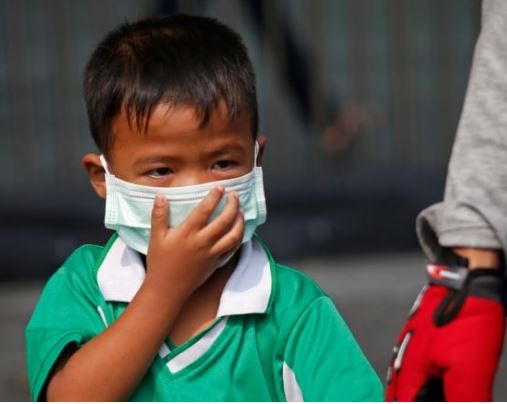Air pollution is one of the world's biggest killers, responsible for more deaths each year than malnutrition, malaria, AIDS, or alcohol and drug abuse.
And a spate of new studies suggest that our problems with unhealthy air are more pernicious and persistent than previously understood.
Today, the American Lung Association released its annual State of the Air report, finding that 43 per cent of U.S. residents — some 141 million people — now live in areas where poor air quality regularly risks damaging their health. That's seven million more people than in the group's last survey.
In places like California — the state that is home to seven of the nation's 10 smoggiest cities — the major driver of air pollution continues to be car and truck traffic, with the rapidly increasing population overwhelming even the most stringent environmental regulations.
Global warming is now also a big factor, creating more hot, dead air days and larger wildfires.
And perhaps most worryingly, only six U.S. metro areas recorded no unhealthy smog or soot days: Bangor, Maine; Burlington, Vt.; Lincoln, Neb.; Wilmington, N.C.; Melbourne, Fla.; and Honolulu, Hawaii.
Overall, the World Health Organization now estimates that 75 per cent of the Earth's population — 5.5 billion people — live in areas where particulate pollution exceeds safety guidelines.
And bad air is understood to be shortening life spans in all sorts of ways.
A recent NASA study used satellite data to model particulate pollution in Africa and concluded that it causes 780,000 premature deaths each year on the continent. The majority of those — 556,000 — are attributed to dust from Sahara Desert storms, but industrial emissions are believed to cause 182,000 deaths, and smoke from cooking and heating fires another 43,000.
In South Asian countries like India, Pakistan and Bangladesh, where air pollution is the most acute, the life expectancy for a child born today is 30 months shorter than in clean air zones.
Air pollution in Canada is now believed to shave three months off a newborn's life expectancy.
Car and truck traffic is being blamed for 4 million new cases of childhood asthma each year worldwide, or roughly 11,000 each day. The study, published earlier this month in the Lancet Planetary Health journal, crunched data from 194 nations and found that per capita, Canada had the third-highest rate of new traffic-related asthma cases, behind China and India.
Researchers at the University of Aberdeen recently reviewed more than a decade of studies and concluded that air pollution has a bigger effect on fetal growth than alcohol, chemical exposure or a poor diet.
Poor-quality air significantly increases the risks of hospitalization for young cancer patients.
It has also been linked to spikes in London, England's crime rate, with incidents of less severe offences like shoplifting and pickpocketing up almost 8.5 per cent on the city's most polluted days, regardless of the wealth of the neighbourhood. (Assault, rape and murder rates don't seem to change with the air quality.)
And another U.K.-wide study found that teenagers who live in the country's smoggiest areas have almost twice the rate of reported psychotic experiences compared to their peers in less-polluted zones. (The researchers are careful to note that they haven't established a causal relation — other factors associated with traffic, like noise, could be the trigger.)
All just the latest additions to 25-years of peer-reviewed research on the dangers of air pollution.
Which makes an editorial published today in the journal Nature all the more noteworthy.
The publication warns of a growing scepticism about the effects of air pollution in places like Germany, Poland, India and above-all the United States.
Efforts by government and industry to weaken air-quality standards are now themselves a threat to public health, says the journal.
Environmental regulations to curb air pollution impose steep costs on a variety of industries, but questioning the evidence won't make it go away," the authors write. "Now is not the time to undermine efforts to clean air — it is time to strengthen them.
